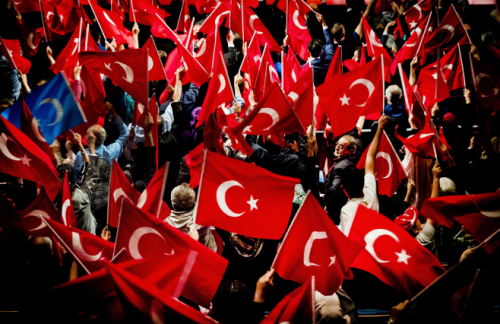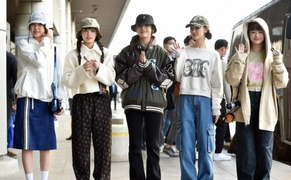 |
| Source: EPA, Yonhap News |
By AsiaToday reporter Jisu Kim
This Saturday is the first anniversary of the failed coup in Turkey. But for the Turkish people, the past year has been "a coup of a different kind."
Turkey's President Recep Tayyip Erdoğan has been using the coup as a means of removing his opponents for the past year. Besides, he emerged as "Sultan of the 21st Century" after a constitutional amendment was passed in the referendum in April, which abolishes the parliamentary system that had lasted for 94 years since "Father of Turkey" Mustafa Kemal Atatürk established the republic and focuses on the president-centered system. Under the new constitution, the president will not only have power to issue executive orders that are in compliance with the law, but will also have a strong influence on the judicial appointments. It means he is now able to hold absolute power.
Last July, the Turkish authorities declared a state of emergency five days after the coup attempt. The state of emergency, which gives the judiciary an enormous power to limit citizens' basic rights for three months, has been extended three times more since then. The government issued massive dismissals, confiscation of corporate assets, and news organization shutdowns through the state of emergency administrative orders. The fourth state of emergency will expire soon but the state of emergency is likely to be extended for a while. Erdoğan said on Wednesday, "We will end the state of emergency when it is no longer needed in our fight against terror," the Guardian reported.
On the same day, Turkey arrested 14 army officers and issued detention warrants for 34 former personnel of the state-owned broadcaster TRT.
Turkey fired 103,824 state employees and suspended 33,483 more for alleged involvement in the coupe for the past year, Deputy Prime Minister Numan Kurtulmus told Bloomberg on Wednesday. "There might be crypto members of FETO who walk on the snow without leaving tracks," Kurtulmus said. He also stressed that Turkey must remove U.S.-based cleric Fethullah Gulen, accused by the government of orchestrating the coup attempt, to ensure national security.
According to data from the Turkish Ministry of Justice, 50,546 suspected members of FETO were in prison and arrest warrants had been issued for 8,000 others. Over the past year, authorities have shut down 110 media outlets on charges of involvement with Gulen's network and abolished coverage for 715 journalists. 168,206 cases have been conducted in connection with the coup attempt.
Due to this, it's the Turkish people who suffer the most. Ozkan Ozakca, who worked as a teacher in Mardin, in southeastern Turkey, was fired on charges of supporting terrorist groups this year. "Two groups (Erdoğan group and Gulen group) had a fight, and now 80 million people are paying the price for it," she said. "What happened after July 15, 2016, is a coup of a different kind."
As the restrictions on the basic rights of the people and repression over various sectors in society continue, the voices against the Erdoğan government are getting louder. A massive anti-government rally was held on Sunday in Maltepe square in Istanbul at the end of a three-week demonstration called the March for Justice. One million people gathered in the square, according to Turkey's main opposition Republican People's Party (CHP), which led the marches and rallies. It is the largest anti-government protest since 2013.
The March for Justice was triggered by a lengthy prison sentence that Enis Berberoğlu received for allegedly disclosing the suspicion that Turkish intelligence is smuggling weapons into Syrian armed organizations. Starting on June 15, protestors marched 450 kilometers from Ankara to Istanbul calling for Turkish justice.
President Erdoğan is strengthening his influence in the international community through active diplomatic activities. For instance, he had a summit meeting with U.S. President Donald Trump in Washington DC on May 16. He also attended the Belt and Road Forum for International Cooperation held in Beijing on My 14-15 as one of the leaders from 28 countries and delegates from 130 countries. Based on strengthened international influence and economic success, his status will be further elevated.
#Turkey #March for Justice #coup #Erdoğan #Gulen
Copyright by Asiatoday
Most Read
-
1
-
2
-
3
-
4
-
5
-
6
-
7





















